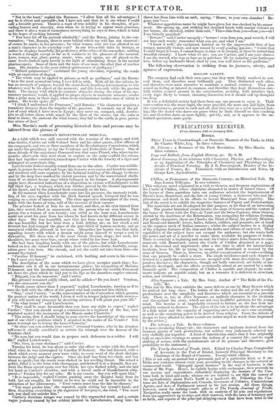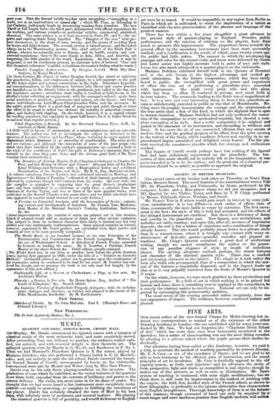PUBLICATIONS RECEIVED.
From January 24th to January 301h.
BOOKS.
Three Years in Constantinople ; or Domestic Manners of the Turks in 1844. By Charles White, Esq. In three volumes.
St. Etienne ; a Romance of the First Revolution. By Miss Martin. In three volumes.
Lays and Balkuls from English History, 4c. By S. M.
Rural Economy, in its relations with Chemistry, Physics, and Meteorology; or an Application of the Principles of Chemistry and Physiology to the details of Practical Fanning. By J. B. Boussingault, Member of the In- stitute of France, &c. Translated, with an Introduction and Notes, by George Law, Agriculturist.
Chan, or Protestants of the Sixteenth Century; an Historical Tale. By Jane Louisa Willyams. In two volumes.
[This religious novel originated in a visit to Geneva, and frequent explorations ot the Castle of Chillon, whose chatelaine abounded in stories of fonner times. Of the heroes of these garrulous tales our authoress selected the imprisonment of
Byron's hero, Bonnivard, and the fate of young Cottier' a Genevese who met im- prisonment and death in his efforts to rescue Bonnivard from captivity. The-
end of the novel is to exhibit the respective features of Popery and Protestantism. The materials are not ill-adapted for this purpose, or for that of an interesting tale. The greater historical events involve the siege of Geneva and the contest of the house of Savoy with the Pays de Vaud and the Swiss Cantons, when Geneva, stirred by the doctrines of the Reformation, was struggling for religious freedom.. For public characters, there are Charles the Third of Savoy, his priestly Minister, and laonnivard himself; lovers, ladies, fathers soldiers, and peasants, are at hand as the common stock of Italian romance; whilst the subject invites to a display of the religious features of the time and the faults and virtues of each sect. These capabilities of the subject have not escaped the authoress; but she wants both the power and art of a novelist to make them available for purposes of fiction. There is certainly a beginning and an end: for Cottier starts from Geneva to com- municate with Bonnivard ; enters the Castle of Chilton disguised as a page, but is discovered and imprisoned; after a due time to allow for intermediate incidents, loses his life in trying to escape, and Bonnivard is rescued by the arms of Geneva. There is, however, no artful concatenation of events—nothing
that can properly be called a story. The single incidents—and each chapter is devoted to a particular occurrence—are occupied with mere descriptions or pur- poseless discourse; the characters though not badly conceived, are feebly or im- perfectly developed; and the effects occasionally aimed at are marred by a melo- dramatic spirit. The composition of Chillon is equable and elegant; its senti- ments indicate an amiable mind; but as a romance it is deficient in structure, action, and vividness.]
Alice Seymour ; a Tale. By Mrs. Grey, Author of " The Belle of the Fa- mily," &c. [This tale by Mrs. Grey exhibits the same defects as one by Mary Hosvitt which we noticed not long since. The habits of the writer and the art of the novelist predominate over the simplicity and directness which are essential to a juvenile tale. There is, too, in Alice Seymour, an unlikely character in the incidents and throughout the story, which are not very healthful pabulum for the young mind. The heroine is as improbably restored to fortune as she has been im- probably reduced to distress. Ile object of the tale is to inculcate the advantage of a firm mind and the capacity of supporting one's self by one's own exertions, as well as the sustaining power to be denved from religion. From the defects of design we have alluded to, these morals are rather urged in words than impressed by the action.] The Ghana; a Tale. In three volumes. [A mere circulating library tale; the characters and incidents derived from the common quarry of such productions, but neither very judiciously selected nor very skilfully put together. A kind of introduction states that it was originally told on successive evenings to amuse the tedium of a country life: and its rapid shifting of scenes, with the melodramatic air of its persons and discourse, give probability to the statement.]
The Yearly Journal of Trade, 1845. Edited by Charles Pope, Comptroller of Accounts in the Port of Bristol, formerly Principal Secretary to the Chairman of the Board of Customs. Twenty-third edition. [This is not only an annual but a perennial, and of a particular kind, as it ex- hibits new varieties almost every year, according to the changes in the natural or commercial world. " Quicquid agunt homines in the way of business, is the- theme of Mr. Pope. Hence, he rightly begins with exchanges; then proceeds to our income and- expenditure, elaborately displaying the receipts of the Cus- toms both in kind and cash; whence we are enabled to see that the outcry of the agriculturists about Peel's Tariff is a landlord's fib. Following the Cus- toms are lists of Diplomatists and Consuls, Governors of Colonies Customhouse Agents, and Acts of Parliament passed in the last session. All these • however, count for nothing—mere gifts-in of The Yearly Journal of Navigation really opens the book, with an analysis of its acts and regulations from sea-apprentices up to ships and their masters, with the laws of bottonuy and so forth, and reports of the principal shipping-cases that have been tried in the- pillow. Part the Second brhitlytouches.upon emsiggling—"nmn,ggling as a trade, not as an inadvertency or casual slif„ ; which Mr.. Pope, as belonging to the Castoms, judiciously heads by denouncing maxims from moralists. The new Tariff at full length forms the third part; interspersed with official regulations for its working, and various remarks on particular articles, commercial, statistical, chemical. The same subject is as it were reversed in Parts TV. and V.; the ex- perts and coasting-trade being handled. The "Dangers of the seas” next pre- sent themselves, in the shape of bars, wrecks, and the means of avoiding them by buoys and light-houses. The seventh section is miscellaneous; and the eighth beings us to the Warehousing system.. The chief subject of the Ninth Part is Aliens ; whence we naturally pass to Europe, and its tariffs, monies, and corn mereial regulations; then to the same things in Asia, Africa, and America, not forgetting the fifth quarter of the world, Australasia. An this book, it may be supposed, is not for continuous perusal, an elaborate index of between "four and flee thousand references "is added, to facilitate the reader's-fmding what he wants.]
Punch's Complete Letter-writer. By Douglas Jerrold. With fifty illus- trations by Kenny Meadows.
[In these Letters, Mr. Punch, or rather Douglas Jerrold, has aimed at satirizing the quackeries, follies, and weaknesses of society, by a self-exposure on the part at the letter-writer and a moral commentary in the reply. Sometimes hypocriti- cal conventionalisms, or the differences between lofty theory and coarse practice are handled—as in the friend's letter to the gentleman just called to the bar, and the barrister's answer • sometimes mere vanity is teethed or tickled—as in the stroller's letter soliciting an engagement, with the manager's refusal; again, harp social conditions or practices, governesses and ushers, are the theme ; and some- times individuals—as Lord-Mayor-Churchwarden Gibbs and his accounts. In the satiric portions there is a good deal of pungency- and point, though at times the effort to be smart is rather too obvious: the morality is somewhat common-
and dashed with claptrap. On the whole however, it is a capital volume for reading anywhere, but especially in spare half-hours; for it is better fitted for occasional than regular perusal.] Vital Magnetism, a Remedy. By the Reverend Thomas Pyne, A.M., La cumbent of Hook, Surrey.
I. A little work in favour of mesmerism, of a commendable tone and an agreeable manner. The author was led to investigate the subject in deference to the :111s ..of Lavater, Cuvier, and La Place; whose testimony he urges against the • m which dismisses it as unworthy of consideration. The cases at the en—rar7e7urious; and although the statements of some of the poor people who think they have benefited by the author's 'manipulations are couched a little in the style of the certificates of Parr's life-pills or Holloway's ointment, they are natural to the class they come from; and the obvious good faith of Mr. Pyne vouches their authenticity.]
771e Beauties of Jeremy Taylor, D.D., Chaplain in Ordinary to Charles the First, and late Bishop of Down and Connor. Selected from all his Devo- tional Writings and Sermons; with a Biographical Notice and a Critical Examination of his Genius and Style. By B. S., Esq., Barrister-at-law. A volume containing Jeremy Taylor's two celebrated sermons on Marriage and
6, Epicurism—" the House of Feasting "—divested of their learned quotations, and
owed by numerous though brief extracts from his works. All very well; but the compiler is mistaken in supposing that the great divine's productions have only been published in a cumbrous or costly form: a selection from the Sermons of Jeremy Taylor, and two or three of his more popular works, were published in the Sacred Classics a few years since; and we think selections have also appeared in another serial devoted to our early divines.]
A Treatise on Factorial Analysis, with the Summation of Series; contain- ing various new developments of functions. By Thomas Tate, Mathema- tical Master of the National Society's Training Institution, Battersea, [ Some improvements in the rotation of series are pointed out in this treatise, which if adopted would add to neatness of finish and often obviate confusion. The subject is from its technical character little likely to interest any but very skilful and very enthusiastic mathematicians. Some general, remarks on science, however, expressed in Mr. Tate's preface, are calculated from their justice and breadth of view to be more generally accptable.]
The Model Book, or one hundred Lessons on the tree Principles of the Pronunciation and Construction of the French Language. Written for the use of Westminster School. A Selection of French Poetry, preceded by Lessons on reading the same. By J. Tourrier, a Parisian, French Master at the above School, &c. Third edition, greatly enlarged. [The Model Book has, in one form or another, been before the public fourteen years; having first appeared in 1880, under the title of a "Treatise on Jacotot's lathed:" Goldsmith advised an author not to presume upon the continuance of hisreptitation unless he continued to be read for ten years: M. Tourrier has out lived his decade, and we presume his book is not only read but bought, by the appearance of this new edition.] Fashionable Life, or a Season at Cheltenham; a Play, in five acts. By Archibald Murray.
Ithrtesty ; &Drama in five acts. By Henry Spicer, Esq., Author of" The Lords of Ellinghilm," &c. Second edition.
Ai s Imitative Version of Sophooles's Tragedy Antigone ; with its melodist- matic dialogue and choruses, as written and adapted to the music of Dr. Felix Mendelssohn Bartholdy. By M. Bartholomew.
NEw Swam,.
Shstehes of Persia. By Sr John Malcolm. Part L (Murray's Home and Colonial Library.)
NEw PERIODICAL.
The British Qumeerly Review, No. 1.



























 Previous page
Previous page